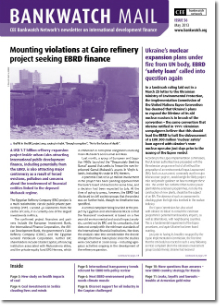One of the great enablers: how the EBRD threatens the environment and human rights in Kazakhstan and Turkmenistan

Bankwatch Mail | 10 May 2013
In its recent report, ‘The great enablers: how investments by international financial institutions threaten the fragile Caspian Sea ecosystem‘, Crude Accountability describes how investments in the Caspian Sea region by international financial institutions, including the European Bank for Reconstruction and Development, are contributing to the intensification of extraction of and trade in the region’s oil and gas.
Kate Watters is the Executive Director of Crude Accountability
This article is from Issue 56 of our quarterly newsletter Bankwatch Mail
Browse all articles on the right
Support for infrastructure and transportation projects, which are not subject to the strict disclosure and environmental assessments that are required of projects in the natural resource extraction portfolio, provides avenues for gas and oil from Kazakhstan and Turkmenistan to get to world markets. The report suggests that the EBRD’s investments in natural resource related projects in Kazakhstan and Turkmenistan, countries with poor track records in human rights and governance – particularly in the oil and gas sector – undermines the institution’s mission and poses serious risks to its reputation.
Read more
The EBRD has provided hundreds of millions of dollars in loans for projects that fund pipelines, roads, port development, the purchase of ice-breaking tugboats, and ship maintenance facilities in Kazakhstan alone. All of these projects support the extraction of oil and gas at Kazakhstan’s major fields, including at Tengiz and Kashagan.
However, because these projects fall under the aegis of infrastructure and transportation, they are not subject to the more intense scrutiny that oil and gas projects undergo. The associated risks are not included in project assessments, and their connection to oil and gas development is ignored.
For example, in 2010 a USD 65 million loan to the company Circle Maritime Invest enabled the purchase of tugboats. The three boats service Agip KCO, the lead operator in the development of the Kashagan offshore oil and gas field, one of the largest, most expensive and environmentally dangerous projects in the region. Without these boats, the Kashagan off-shore platforms could not be serviced year-round, as the north Caspian is icebound for much of the winter.
However, the EBRD claims no responsibility for the dangers associated with the Kashagan field. As the EBRD project summary document states, “The acquisition of three new tug boats is associated with limited environmental and social impacts that can be readily identified and mitigated. Therefore, the project is categorised as B.” The EBRD documents make no mention of the fact that Kashagan, the second largest oil field in the world, is difficult to develop “because of the harsh offshore environment, where sea ice is present in winter and temperatures can range from -35 °C in the winter to 40 °C in the summer. More significantly the oil is light with a high gas-oil ratio and a very high hydrogen sulphide (H2S) gas content of about 20%.”
In addition to the environmental and social problems associated with Kashagan, ENI, one of the companies active at the field, was accused of bribing Kazakhstani officials in 2012. By financing projects that support Kashagan, rather than financing the project itself, the EBRD is able to distance itself from corruption at this field and in other projects throughout the region, where corruption, particularly in the oil and gas sector, remains rampant.
The EBRD has no current investments in Turkmenistan, which support the oil and gas sector. However, its 1999 USD 75 million loan to Dragon Oil enabled the company to develop the Cheleken Field, which is approximately 50 kilometres offshore from the Cheleken Peninsula, and which averaged 67,600 barrels of production per day in 2012.
The EBRD also provided a USD 47 million loan to rehabilitate the Turkmenbashi Port in 1997 – the bank’s first investment in Turkmenistan’s public sector. Turkmenbashi Port is Turkmenistan’s largest port, and most goods transported through the port are petroleum products. In 2012, the Baku Tbilisi Ceyhan Pipeline pumped 2,520,000 tons of Turkmen oil, which was transported by tanker from Turkmenbashi, across the Caspian Sea to the Sangachal Terminal where it was loaded into BTC.
Crude Accountability’s report recommends that the EBRD and other IFIs abstain from investing in state-controlled resource-related projects, including those in the transportation and infrastructure sectors; institute human rights assessments as a standard part of their review of potential projects; and avoid sensitive areas and scale up disaster preparedness assistance.
Read more
‘The great enablers’ report by Crude Accountability is available in pdf at:
http://crudeaccountability.org/wp-content/uploads/2012/12/Great-Enablers.pdf
Theme: Social & economic impacts | Other harmful projects
Location: Kazakhstan
Tags: BW Mail 56
Never miss an update
We expose the risks of international public finance and bring critical updates from the ground. We believe that the billions of public money should work for people and the environment.
STAY INFORMED
